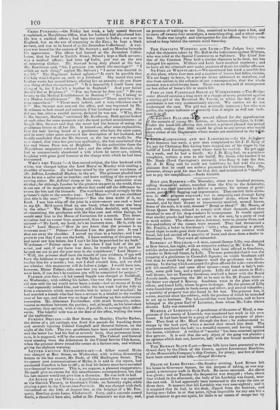THE CONVICTS WITHERS AND LUSH.—The Judges have over- ruled the
objection taken by Mr. Ball to the indictment against Withers, who was tried at the Special Commission at Salisbury. The Chief Jus- tice of the Common Pleas held a similar objection to be fatal, but has changed his opinion. Writhers and Lush have received reprieves ; and so have ail the criminals now under sentence of death for similar offences.
No FIRE AT WHITSTABLE.—We mentioned last week a terrible fire at this place, where four men and a number of horses bad fallen victims. We are happy to learn, by a private letter addressed to ourselves, and also from notices in the columns of our contemporaries, that the whole account was a mischievous hoax. There was no fire, and of consequence no loss either of horse's life or man's life.
FIRE AT THE PARSONAGE HOUSE AT WIT wrcomuE.—The Bridge- water Herald contains a long story of a charge of arson preferred against a serving girl of the Reverend Mr. Vera', in when the lady of that gentleman is not very ceremoniously treated. We confess we do not understand the case. The girl was evidently ,innocent ; but who was guilty, the report indicates so scurelv that it might as well not indi- cate It at all.
ODACIOUS PLACARD. reward offered for the apprehension f the assassin of young Mr. Ashiton, at Ashton-under-Lme, is WO/.
nder the hand-bill offering this reward, a printed placard was'poited ast week, stating that 5001. would be given to any person who would hoot either of the Magistrate& whose names are mentioned in the hid- bill.
ARRINGTON • AND IIIS LABOURERS —At the Avleabary Petit Sessions last week, a poor man complained to Sir J. D. Xing' of his pay for Christmas Day having been stopped out of his wages by the bailiff of Lord Carrington, upon whose farm he worked. He got olay: Os. a week, and he had a family. Sir J. D. King hail, on a pretieus complaint, written -a note to the bailiff, Mr. Stone, who handed it to Mr. Neale (Lord Carrington's steward), who flung it into the fire. Sir J. D. King said he could not interfere; he had told the com- plainant that he could not enforce payment for Christmas Day. He, however, always paid his men for that day, and considered it "shabby" not to pay the coinplainant.—Bucks Gazette.


























 Previous page
Previous page